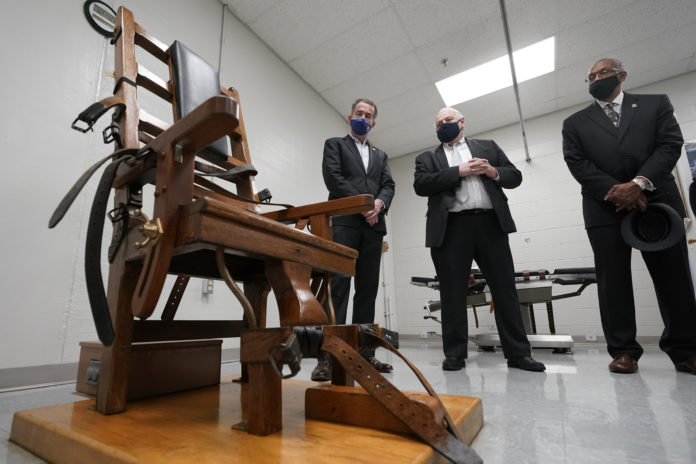(RNS) — Faith groups are celebrating Virginia’s decision to ban the death penalty, a move considered to be a victory for religious opposition to capital punishment.
Virginia Gov. Ralph Northam signed the ban — the first of any Southern state and the 23rd overall — into law on Wednesday (March 24), declaring it “the moral thing to do.”
“Over our 400-year history, Virginia has executed more people than any other state,” Northam said. “The death penalty system is fundamentally flawed — it is inequitable, ineffective, and it has no place in this Commonwealth or this country. Virginia has come within days of executing innocent people, and Black defendants have been disproportionately sentenced to death.”
The Rev. LaKeisha Cook, a lead organizer at the Virginia Interfaith Center for Public Policy, also spoke at the signing ceremony.
“Today I stand here representing many people of faith all throughout the commonwealth of Virginia,” Cook said. “Virginia Interfaith was very, very happy to join officially in this fight for abolition. Today we turn the page in the history books of this great commonwealth as we celebrate the end of the death penalty.”
Cook pointed to the activism of the state’s “amazing faith community,” such as those who held prayer vigils at sites of lynchings in January to highlight the historical link between early racist killings and the modern death penalty, or the nearly 430 faith leaders who signed on to a letter opposing the death penalty in February.
Cook noted the advocacy of the Virginia Catholic Conference, which also voiced support for the ban on Wednesday. Bishop Michael F. Burbidge of the Diocese of Arlington and Bishop Barry C. Knestout of Richmond released a statement citing Pope Francis, whose 2020 encyclical “Fratelli Tutti” included the line: “The firm rejection of the death penalty shows to what extent it is possible to recognize the inalienable dignity of every human being and to accept that he or she has a place in this universe.”
“Through our Virginia Catholic Conference, we supported this historic legislation as it progressed through the General Assembly because all human life is sacred,” read the statement from Burbidge and Knestout. “We are grateful to those who worked to make this a reality.”
Catholics in the U.S. have long opposed capital punishment, and Francis voiced support for abolishing the practice during his 2015 address to Congress.
But the pontiff made things even more explicit in 2018 when he changed the church’s catechism to declare the death penalty “inadmissible” and insist that the church will work “with determination for its abolition worldwide.”
The Virginia bishops were joined in their celebration by Archbishop Paul S. Coakley of Oklahoma City, who chairs the U.S. Conference of Catholic Bishops’ Committee on Domestic Justice and Human Development.
“Virginia will become the twenty-third state to abolish the death penalty, and I urge all other states and the federal government to do the same,” Coakley said in a statement.
He praised the work of advocates such as the Catholic Mobilizing Network before adding: “We are reminded that God created and loves every person, and we can respond to this love with reverence for the dignity of every human life, no matter how broken, unformed, disabled, or desperate that life may seem.”
Opposition to the death penalty has grown over the past few decades and is common in several faith communities. A 2018 Public Religion Research Institute survey found that 55% of Americans preferred life in prison without parole instead of capital punishment for people convicted of murder, compared with 44% who preferred the death penalty. Majorities of Black Protestants (80%), non-Christian religious groups (57%) and white Catholics (54%) also favored life in prison.
Of those polled, only two groups expressed majority preference for the death penalty: white evangelicals (62%) and white mainline Protestants (54%).
Virginia Catholics were echoed by other stalwart faith-rooted opponents of the death penalty this week, such as Christian activist and author Shane Claiborne. He championed the ban when versions of it first passed both chambers of the state legislature in February, and he called on the federal government to do the same.
“President (Joe) Biden is poised to do the same thing Virginia just did: reckon with the mistakes of our past and use that past to help us envision a better future — one without the death penalty,” Claiborne wrote.
Biden, a Catholic, proposed eliminating the federal death penalty in 2019 during his campaign for president, but he has yet to take sweeping action regarding the promise — which would require support from the Supreme Court or Congress — since beginning his term.
Former President Donald Trump was widely criticized by faith leaders for his administration’s 2020 decision to renew the use of the death penalty in federal cases for the first time since 2003. Among various protests, more than 1,000 faith leaders signed a letter that summer demanding Trump and then-Attorney General William Barr end the practice.
Biden has already heard from fellow Catholics on the issue: During the first Mass he attended as president, the priest delivered a homily blasting the Trump administration’s renewed use of the death penalty and referring to the former commander in chief as an “execution president.”
When White House press secretary Jen Psaki was asked during a press briefing on Monday whether Biden would support the Supreme Court if it reinstated the death penalty for Boston Marathon bomber Dzhokhar Tsarnaev, she noted that Biden has “grave concerns about whether capital punishment … is consistent with the values that are fundamental to our sense of justice and fairness,” but referred specific questions about the case to the Department of Justice.
This article originally appeared here.

